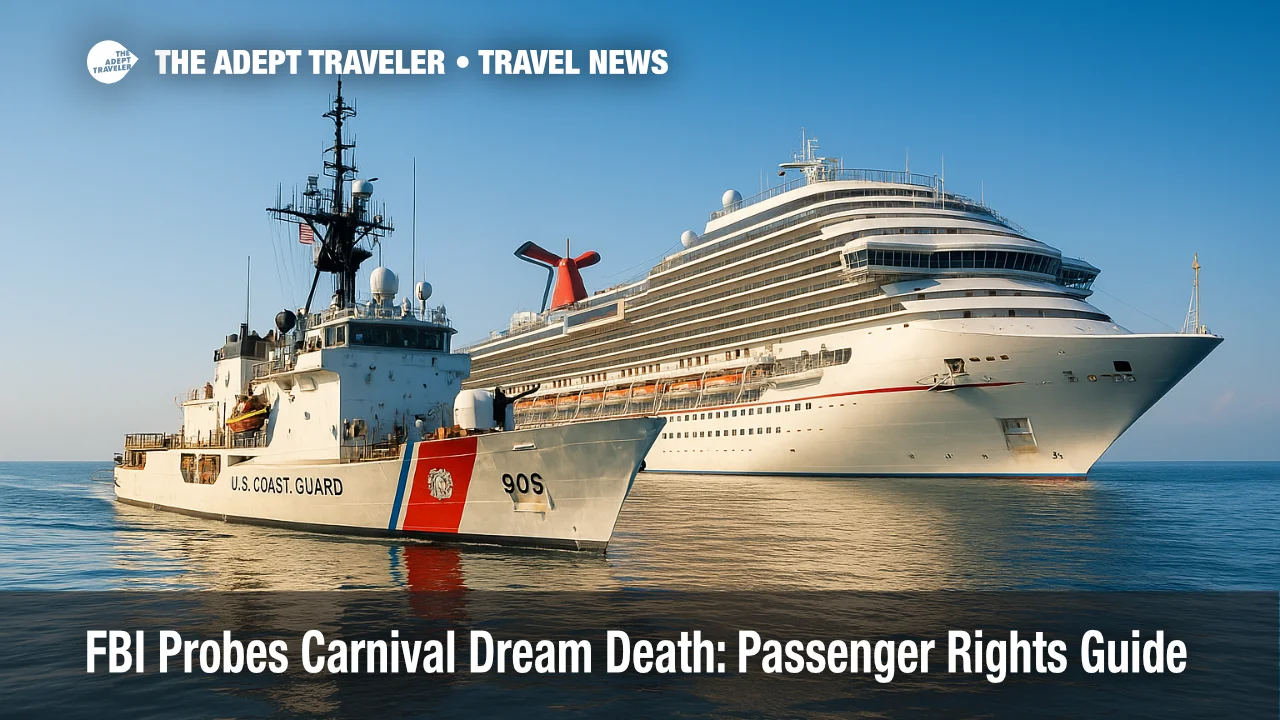FBI Probes Carnival Dream Death: Passenger Rights Guide

A death aboard Carnival Dream has triggered an FBI-led probe coordinated with the U.S. Coast Guard while the ship is docked in the Gulf of Mexico. The incident, reported July 23, raises familiar jurisdiction questions at sea and reminds travelers that serious investigations can delay disembarkation. Complicating matters, a Royal Caribbean crew member on Icon of the Seas allegedly stabbed a colleague on July 24 and then jumped overboard-his body was later recovered. These back-to-back cases highlight what happens when a cruise becomes a crime scene, what protections passengers enjoy, and how travel insurance can soften the financial blow.
Key Points
- Why it matters: Crime scenes at sea can detain ships for hours or days, stranding thousands.
- FBI and Coast Guard follow joint protocols to secure evidence and interview witnesses quickly.
- The 2013 Cruise Passenger Bill of Rights guarantees care, refunds, and free communication in major disruptions.
- Trip-interruption insurance can reimburse unused cruise days and added hotel or flight costs.
- Royal Caribbean's recent attempted-murder case shows how foreign police join U.S. agencies near port.
Snapshot
Carnival Dream, home-ported in Galveston, reported an unexplained death on its Western Caribbean itinerary. FBI Houston confirmed it is coordinating with the Coast Guard, Customs and Border Protection, and Carnival's security team. While the cruise line called online speculation "disappointing," agents boarded the vessel to collect evidence before guests debarked. Just a day later, Royal Caribbean's Icon of the Seas diverted near the Bahamas after a male crew member stabbed a female coworker and leapt into the ocean. The woman survived; the assailant was recovered dead. Both events underscore the layered jurisdiction that kicks in whenever serious crime intersects with international waters.
Background
Under the Cruise Vessel Security and Safety Act and a 2007 reporting accord between CLIA lines, the Coast Guard, and the FBI, cruise operators must alert federal authorities to alleged homicides, assaults, or suspicious deaths involving U.S. citizens or voyages touching U.S. ports. The FBI typically asserts lead jurisdiction if the victim or suspect is American or if the ship embarks or ends in the United States. Coast Guard investigators secure the scene, preserve digital CCTV, and may escort the ship to port. Foreign flag-state and local police join once the vessel docks, often taking custody of suspects or remains. Cruise lines are required to provide private victim advocates, evidence storage, and certified medical staff trained in forensic procedures.
Latest Developments
Carnival Dream timeline
Agents boarded in Mobile early July 27, interviewed crew, isolated cabins, and downloaded security footage. Passengers reported overnight sirens and public-address calls for medical aid on the Serenity Deck. Carnival has not classified the death as suspicious but pledged "full cooperation." Embarkation for the next sailing may be delayed if forensic teams need more time; guests should monitor email and port-agent texts for updates.
Royal Caribbean overboard case
On July 24 near CocoCay, surveillance captured a 35-year-old South African crew member stabbing a colleague aboard Icon of the Seas. Ship security initiated "Oscar" man-overboard protocol within minutes as the suspect jumped from Deck 8. Rescue boats recovered him unresponsive; the victim is stable after surgery. Royal Bahamian Police are leading the criminal inquiry with FBI liaison support because both crew members are foreign nationals and the crime occurred in Bahamian waters. The ship resumed schedule after a six-hour delay.
Analysis
For travelers, the immediate fallout from a shipboard death is logistical. Authorities can detain a vessel until they catalog evidence, which may cancel ports or extend the cruise unexpectedly. The Cruise Passenger Bill of Rights entitles guests to necessities-food, water, power, medical care-and free calls or internet to adjust plans. If the voyage ends early or is substantially altered, passengers may claim a prorated refund or future cruise credit. Travelers with comprehensive trip-interruption insurance fare even better: most policies reimburse unused prepaid cruise days, extra hotel nights, and rebooked flights when a covered event-such as a crime investigation-causes a delay exceeding six hours. Insurers typically require documentation from the cruise line or law enforcement, so keep official letters and incident notices. Credit-card coverage is helpful but often caps interruption benefits at $500, well below the cost of an international flight. Given the rare yet real risk of onboard crime, savvy cruisers should buy a plan offering at least $2,500 in trip-interruption and $100,000 in medical evacuation coverage.
Final Thoughts
Deaths and violent crime at sea remain uncommon, yet this week's incidents aboard Carnival Dream and Icon of the Seas prove they can happen on any itinerary. Knowing how federal and local agencies investigate, what rights the Passenger Bill guarantees, and how travel insurance cushions disruptions empowers travelers to cruise with confidence-even when the unexpected strikes.
Sources
- "Death investigation underway on Carnival cruise ship" - KHOU / CNN Newsource
- "Royal Caribbean Crew Member Stabbed Fellow Worker Before Jumping Off Ship to His Death" - PEOPLE Magazine
- "Cruise Ship Crime and Security" - FBI Congressional Testimony
- "Cruise Industry Passenger Bill of Rights" - CLIA Press Release
- "Cruise Insurance and Crime at Sea: Are You Covered for the Unexpected?" - Kiplinger
